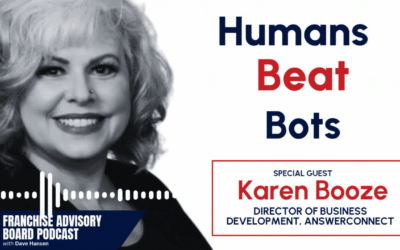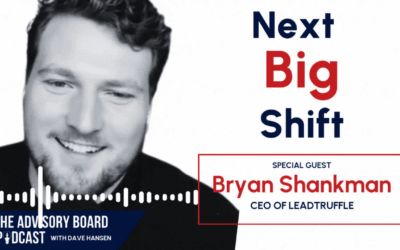In the rapidly evolving world of franchise marketing, staying ahead of the curve requires not just knowledge but also the right tools and strategies. In a recent episode of The Advisory Board podcast, hosted by Dave Hansen, two seasoned experts, Kylon Gustin and David Stein, shared their insights on the transformative role of AI in franchise marketing. As co-founders of innovative AI-driven platforms, Gustin and Stein have been at the forefront of integrating technology into marketing strategies, particularly within the franchising sector. This article recaps their conversation, highlighting the critical points discussed and offering practical insights into how AI is reshaping the industry.
The Challenge of Training AI in Franchise Marketing (06:44 – 09:00)
Kylon Gustin kicked off the discussion by addressing one of the most significant challenges in AI marketing: training AI systems to effectively analyze ad copy in the franchise industry. “AI is only as good as the data you use to teach it,” Gustin emphasized, underscoring the complexity of this task. Unlike other sectors where generic AI solutions might suffice, franchise marketing demands a more nuanced approach. The data fed into these systems must be both extensive and highly relevant to the industry. Gustin highlighted how their team has spent months, if not years, fine-tuning their AI platforms to ensure they can meet the specific needs of franchise businesses. This process involves not only feeding the AI vast amounts of data but also guiding it through the intricacies of franchise-specific marketing challenges.
Your browser does not support the video tag.
AI’s Role in Ad Copy Analysis and Campaign Improvement (12:57 – 15:20)
As the conversation progressed, Gustin delved into the practical applications of AI in marketing. One of the standout features of their platform is its ability to analyze and rewrite ad copy, making it more effective in reaching the target audience. “We’ve trained our AI to not just analyze the ad copy but also to make intelligent recommendations based on real-time data,” he explained. This capability is particularly valuable in the fast-paced world of digital marketing, where ad performance can fluctuate dramatically. By continuously learning from the data, AI can suggest improvements that optimize advertising efforts, ensuring that campaigns are both effective and efficient.
Your browser does not support the video tag.
AI’s Potential in Analyzing Emotional Connections in Ads (15:00 – 17:45)
David Stein then explored a more advanced aspect of AI’s role in marketing: its ability to analyze emotional connections in ads. While much of AI’s current application focuses on textual analysis, Stein discussed the growing potential for AI to assess visual content—images and videos—and their emotional impact on audiences. “It’s not just about what the ad says, but how it makes people feel,” Stein remarked. This is a critical area where AI is beginning to show promise, as it can provide insights into how different elements of an ad—whether visual or textual—work together to engage the audience on an emotional level. This holistic approach to ad analysis is still in its early stages but represents a significant leap forward in AI’s capabilities.
Your browser does not support the video tag.
AI as a Tool, Not the Full Solution (20:59 – 23:20)
Towards the end of the episode, Stein offered a word of caution, reminding listeners that AI should be viewed as a tool rather than a complete solution. “AI can significantly reduce costs and increase conversion rates, but it’s not a magic bullet,” he noted. The key to successful AI implementation in marketing lies in using it to augment, rather than replace, human expertise. This means that while AI can handle tasks like data analysis and ad optimization, human oversight is still crucial to ensure that the results align with the brand’s voice and overall strategy.
Wrap Up Thoughts
The Advisory Board podcast episode featuring Kylon Gustin and David Stein offered a deep dive into the evolving role of AI in franchise marketing. From the challenges of training AI with industry-specific data to its potential in analyzing emotional connections in ads, the discussion highlighted both the opportunities and limitations of this powerful technology. As Gustin and Stein illustrated, the key to leveraging AI successfully lies in understanding its role as a supportive tool—one that, when properly trained and used in conjunction with human expertise, can drive significant improvements in marketing performance. For franchise owners and marketers looking to stay ahead in a competitive landscape, these insights provide a valuable roadmap for integrating AI into their strategies.
For more insights and to learn how AI can enhance your franchise marketing efforts, check out the ClientTether CRM features and explore the latest tools at Saleschatz. To dive deeper into the conversation, you can also watch the full episode on YouTube or listen to it on Spreaker.




